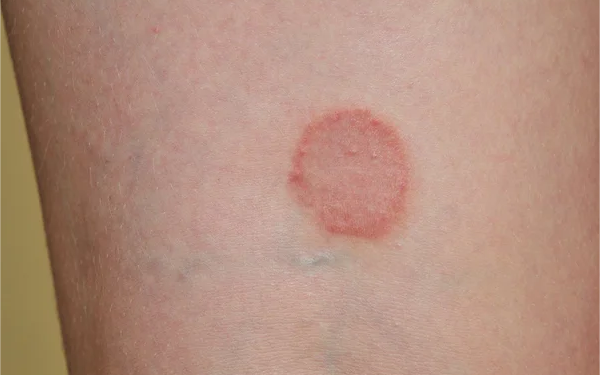Ringworm, also known as tinea, is a common fungal infection that affects the skin. Despite its name, it has nothing to do with worms. Instead, it’s caused by dermatophytes, a type of fungus that thrives on the outer layer of your skin. The infection gets its name from the ring-like rash it often produces. If you’re wondering whether ringworm is contagious by touch, the answer is yes. This article will explain in detail how ringworm spreads, the symptoms to look out for, and the steps you can take to prevent it.
What Is Ringworm?
Ringworm is a fungal infection that typically causes a red, itchy rash in a circular or ring-like shape. It can affect different parts of the body, including the scalp, feet (athlete’s foot), groin (jock itch), and nails. Ringworm is a superficial infection, meaning it only affects the outermost layers of the skin, but it can be very uncomfortable. It is caused by fungi that thrive in warm, moist environments, such as locker rooms, swimming pools, and shared towels.
How Does Ringworm Spread?
Ringworm is highly contagious, and it can spread easily through direct and indirect contact. The most common way it spreads is by touching someone who has the infection or by touching contaminated objects. Let’s look at the different ways ringworm can spread:
1. Direct Skin-to-Skin Contact
Ringworm is most often spread through direct contact with the skin of an infected person. This can occur when you touch the rash of someone who has the infection. If the fungus comes in contact with your skin, it can start to grow, leading to an infection. This is why the condition is particularly common in places where people are in close contact, such as sports teams or dormitories.
2. Indirect Contact with Contaminated Objects
Ringworm can also spread through contaminated objects. These include towels, clothing, combs, brushes, and bedding. The fungus can survive on these items for a period of time, allowing it to spread even without direct skin-to-skin contact. If someone with ringworm uses a towel and you then use the same towel, you could become infected. This is one of the reasons why it’s important to avoid sharing personal items.
3. Pets and Animals
Pets, especially cats and dogs, can carry the ringworm fungus and spread it to humans. If your pet has ringworm, they can pass it to you through close contact, such as petting, or by touching surfaces that the animal has been on. This is particularly common with cats and farm animals, which are known to carry ringworm.
4. Surfaces in Public Areas
Ringworm can live on various surfaces, such as gym floors, swimming pool decks, and locker room benches. Fungi thrive in these moist, warm environments, making it easier for people to come into contact with them. If you walk barefoot in a public shower or locker room, you risk contracting athlete’s foot, a type of ringworm that affects the feet. It’s always important to wear sandals or flip-flops in such areas to reduce your risk.
Symptoms of Ringworm
The most common symptom of ringworm is a red, itchy rash that may be circular or ring-shaped. The rash may have raised edges and clear skin in the center, creating the characteristic “ring” appearance. Other symptoms include:
- Scaly patches of skin that may be cracked or blistered
- Itching or burning sensations, especially in the affected area
- Infected hair follicles (on the scalp, for example)
- Hair loss in areas affected by scalp ringworm
- Discoloration or thickening of nails (when ringworm infects the nails)
Although these symptoms are typical, the severity of the infection can vary. In some cases, the rash may not be as distinct or may appear as a general redness without the typical ring shape.
Is Ringworm Contagious by Touch?
Yes, ringworm is contagious by touch. The fungus that causes ringworm lives in the infected person’s skin, hair, and nails. When you touch these areas, especially the rash, you can pick up the fungal spores, which can then infect your skin. This is why it’s so important to avoid touching the rash of someone who has ringworm and to wash your hands thoroughly after touching anything that might be contaminated.
It’s also important to note that the fungus can spread before the rash is visible. Even if someone does not show symptoms, they can still spread the infection, especially during the first few days when the fungus is actively multiplying on their skin.
Risk Factors for Getting Ringworm
While anyone can get ringworm, some people are more at risk. The following factors can increase your chances of becoming infected:
Close contact with infected people: As we mentioned earlier, ringworm is contagious by touch, so spending time with people who have it increases your risk.
Poor hygiene: Not showering or washing your hands regularly can increase your risk of getting ringworm.
Weakened immune system: People with weakened immune systems, such as those with HIV/AIDS or cancer, are more susceptible to infections, including ringworm.
Humidity and warmth: Fungi that cause ringworm thrive in warm, damp environments. People who sweat a lot or live in hot, humid climates are more likely to develop the condition.
Contact with animals: Pets can carry ringworm, so if you have close contact with animals, especially those with visible skin issues, you should be cautious.
How to Prevent Ringworm from Spreading
If you have ringworm or are at risk of contracting it, there are several steps you can take to prevent it from spreading to others:
1. Practice Good Hygiene
The best way to prevent ringworm from spreading is by practicing good hygiene. Wash your hands regularly, especially after touching infected skin or contaminated objects. Shower immediately after exercising or sweating heavily to remove any potential fungi from your body. Always dry your skin completely after washing, as fungi thrive in damp environments.
2. Avoid Sharing Personal Items
To prevent ringworm from spreading, avoid sharing towels, combs, brushes, clothing, or bedding. If you must share these items, make sure they are washed thoroughly before use by another person.
3. Keep Infected Areas Covered
If you have ringworm, keep the affected area covered with clean, dry bandages or clothing to prevent it from coming into contact with others. This is especially important in public places like gyms, pools, and schools.
4. Disinfect Shared Spaces
Ringworm can survive on surfaces, so it’s essential to disinfect shared spaces. Clean and disinfect gym equipment, locker rooms, and public showers to prevent the fungus from spreading.
5. Treat Infected Pets
If you have pets, make sure they are treated for ringworm if they show any signs of infection. Regularly clean and disinfect their bedding, toys, and grooming tools to reduce the risk of the fungus spreading.
How Is Ringworm Treated?
Ringworm is treatable, but it can take time. Most cases can be treated with antifungal creams, lotions, or powders that are applied directly to the affected area. If the infection is severe or affects the scalp or nails, oral antifungal medications may be needed. It’s important to follow the treatment plan and complete the full course of medication, even if symptoms start to improve, to ensure the infection is fully gone.
For scalp ringworm, oral medication may be necessary because topical treatments don’t always penetrate deep enough to treat the infection.
When to Seek Medical Help
While ringworm can often be treated at home with over-the-counter antifungal treatments, it’s important to seek medical help if:
- The infection doesn’t improve with treatment
- The infection spreads to other parts of your body
- You have a weakened immune system or other underlying health conditions
- The infection is on your scalp, nails, or in a large area of your body
A healthcare provider can help diagnose the condition and recommend the most effective treatment.
Conclusion
Ringworm is indeed contagious by touch, and it can spread easily through direct and indirect contact. It’s essential to practice good hygiene, avoid sharing personal items, and disinfect shared spaces to reduce the risk of getting or spreading the infection. While it can be uncomfortable, ringworm is treatable, and with the right care, you can clear up the infection and prevent it from spreading to others. If you suspect you have ringworm, it’s important to take steps to treat it promptly and seek medical advice if necessary.
Related topics


























